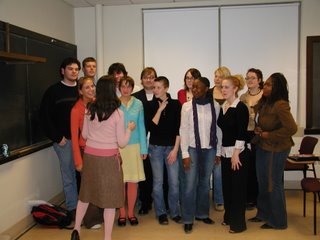poetry 3 (the long one)
 I got a card from the University of Iowa press when I was a senior in college. It is bright green with bright blue writing; it reads POETRY IS FOR EVERYBODY. I hung it over my desk when I began graduate school.
I got a card from the University of Iowa press when I was a senior in college. It is bright green with bright blue writing; it reads POETRY IS FOR EVERYBODY. I hung it over my desk when I began graduate school.It's a complex sentiment for me, this democracy. Yes, poetry is for everybody. I believe this. But then how do I differentiate between good and bad--can a value judgment even be made? I knew I would have to confront this question as I began teaching. Good. Bad. They're relative, right? I know many of the poems I cringed at were met with high praise by their authors' peers in class critique. So what makes a good poem?
 For me, a strong poem is marked by its innovative and intelligent use of language first of all. I am thinking of Anne Carson's writing (specifically Autobiography of Red: "Herakles lies like a piece of torn silk in the heat of the blue saying/ Geryon, please. The break in his voice/ Made Geryon think for some reason of going into a barn/ first thing in the morning/ when sunlight strikes a bale of raw hay still wet from the night"--pg. 54). The images are precise and beautiful and evocative, and they are communicated by language that is unexpected and interesting.
For me, a strong poem is marked by its innovative and intelligent use of language first of all. I am thinking of Anne Carson's writing (specifically Autobiography of Red: "Herakles lies like a piece of torn silk in the heat of the blue saying/ Geryon, please. The break in his voice/ Made Geryon think for some reason of going into a barn/ first thing in the morning/ when sunlight strikes a bale of raw hay still wet from the night"--pg. 54). The images are precise and beautiful and evocative, and they are communicated by language that is unexpected and interesting.A strong poem will make its reader think. I don't mean that poetry should be, necessarily, a mental strain. I don't think the aura of difficulty that's projected onto poetry is healthy for it or for the people who would like to read it, but feel (or have been made to feel, perhaps by a high school English teacher with a snobbish attitude) intimidated by it. But reading poetry is not like watching a blockbuster movie. It's a place for work.
In the end, though, the purpose and strength of a poem is its expression of truth (the Keatsian truth, which equates to beauty, and is "all ye know on Earth/ And all ye need to know"). The work of poetry is the work of creating beauty--not glossing over what is dirty or depressing or ugly, but somehow rendering those things in such a way as to create a consciousness that goes beyond them. Not just anger, not just sadness.
 AND A FEW QUICK TIDBITS:
AND A FEW QUICK TIDBITS: 1/ Poetry doesn't have to rhyme. In fact, most modern poetry doesn't. If you'd like to see a master of the formal poem, look up Elisabeth Bishop's work. Her most widely anthologized poems are probably "One Art" (a villanelle, I believe) and "Sestina" (a sestina).
1.5/ Also, most contemporary poets don't capitalize the initial letter of every line. Some do. some do, depending on the poem.
2/ Journaling and so-called 'writing therapy' are useful and helpful ways of working out initial problems or ideas on the page. In the end, though, the poem is a communication device, meant to establish connections between writer and reader. Being so, it is important that there is at least some point of access for the reader--that not everything is totally private or involved with the self.
3/ The emotional response is a valid and important primary response to a work of writing. When you're reading and you feel, that's worth noting. But figuring out what you're feeling, and why, and how the poet makes it happen--that's the next, equally necessary, response. Just liking the poem can't be enough.
4/ The 'paragraphs' of a poem are called stanzas. Lines that end with punctuation are 'end-stopped,' and lines that break without punctuation are 'enjambed.' I realize this is kind of basic but thought maybe some people wouldn't know and might like to.
---
I hope I don't sound just awfully didactic. I don't write about this here much because I do love it, and I love teaching it, and it is hard to convey nuance through the blog. I would love to answer questions, engage in dialogue, whatever you like, in the comments.
And a favorite poem, to end with:
From the book Eve's Striptease, which is totally worth the sixteen bucks or however much, by the poet Julia Kasdorf.
On Leaving Brooklyn
after Psalm 137
If I forget thee
let my tongue forget the songs
it sang in this strange land
and my heart forget the secrets
only a stranger can learn.
Borough of churches, borough of crack,
if I forget how ailanthus trees sprout
on the rooftops, how these streets
end in water and light,
let my eyes grow nearsighted.
Let my blood forget
the map of its travels
and my other blood cease
its slow tug toward the sea
if I do not remember,
if I do not always consider thee
my Babylon, my Jerusalem.
---
It gives me chills.
Until tomorrow, then.



11 Comments:
I love "Autobiography of Red." I have a copy nearby me so that I can look at it close at hand. I still haven't finished reading it, but I love going back and re-reading it over and over. Do you like Michael Burkard?
great poem. and i like your template for critiquing (sp?) poetry. i've always enjoyed poetry, but at the same time have felt that good poetry is scarce and bad poetry is vast. i think it is one of the more difficult forms of self-expression.
Beautiful post, thank you! I was pretty turned off of poetry in my AP English class in high school. Time to get back into it, I think.
thanks for the post. I love reading poetry, esp aloud. It's great to find people to share it with.
Thanks you for encouraging me to walk to the shelf of books that are my roots in poetry... I have not visited there in quite a long time... it has been a lovely morning.. and so:
Words When We Need Them - Naomi Shihab Nye
Before this early moment,
another, ripe with rain,
the scent of its own full shape.
Each day the rooster
we have never seen
raises the first greeting
and darkness which holds us
in its loose pocket all night
sets us down.
Now we walk,
waking up rooms,
switching on lights.
Into the breath,
wordless but ripe
with all possible words,
messages not yet gathered
or sent.
Morning looms,
more friend than
the best friend.
We could still say.
i look at visual art with some of the same criteria....
what about simplicity in language... sort of finding - and perhaps more importantly pointing out the essence of words...
Let my blood forget
the map of its travels
that shakes me to the core.... wow
chills.
what
an
amaz
ing poem.
it made
my whole
body
sigh.
i could not be enjoying this discussion of poetry more. thank you so much for the notes, ideas, thoughts, poems/poets introductions, etc. you have made me crave poetry again. take good care, shari
3/ The emotional response is a valid and important primary response to a work of writing. When you're reading and you feel, that's worth noting. But figuring out what you're feeling, and why, and how the poet makes it happen--that's the next, equally necessary, response. Just liking the poem can't be enough.
> I would like to hear why you think this is the case. I feel neutral about this assertion.
I may post this to my poetry site www.poetryinbaltimore.com and see what comments might be.
I like your blog. I 'm a newcomer, but I'll be back.
Feeling is important, often primary, and separate. For some people, feeling is enough. Even e.e. cummings: "since feeling is first/ he who pays any attention to the syntax of things/ will never wholly kiss you." But for me an opening of a poem with my intellect allows me to love the poem more completely--I see textual investigation as an act of adoration of the corpus of the poem.
I don't want to be prescriptive, and I certainly don't mean all this 100% of the time--there are poems I just love for how they make me feel or what they make me see, (like Billy Collins' "Litany," the only poem of his I really like) and that's okay. But in my experience, many people are content with only feeling, and to me that's not enough because then what do you do with the poems that don't make you feel, or the poems that don't make you feel something you'd like to feel?--When I was younger, I worked this way, and I dismissed what didn't hit me. Once I learned other ways into poetry (asking why, asking what, asking how), I was not only able to begin to feel about the poems I didn't 'get' before, I was also able to learn from what the poets were doing--to take the poems apart, like little machines (Williams: "little word machines") and see what the parts did, and then use some of those parts later in my own writing.
I would rather you didn't repost this, actually, but you're welcome to link to it if you would like.
I read your post about living in France, and dealing with the culture differences and I related to it....as having just spent a year living in Brooklyn after living in the Midwest all my life.....This Poem "on Leaving Brooklyn" really hit my heart, as we are back in Michigan now, and I will never forget "the secrets only a stranger can learn".....p.s. my sister and brother-in-law are poets; Julie Moulds and John Rybicki....my husband and I are artists, not a very practical family....lol!
Post a Comment
<< Home